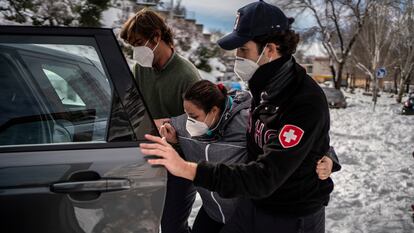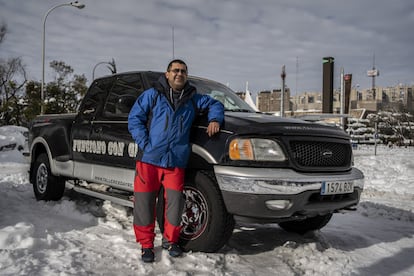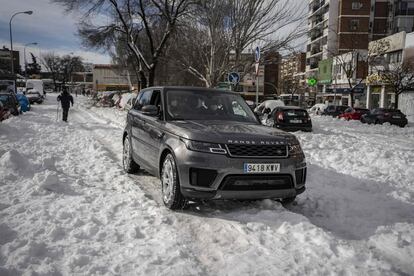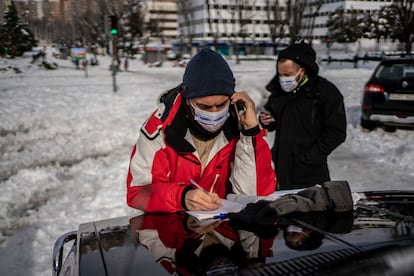Madrid’s ‘4x4 angels’ rescue snowed-in citizens in need of medical help
In the wake of Storm Filomena, volunteers with four-wheel-drive vehicles use Telegram to organize teams that go where the overwhelmed emergency services cannot

-Hi, there’s an 88-year-old woman with a medical condition. She needs to go to the hospital and we’re calling 112 and 061 but we’re getting nowhere.
-We’ll be there in 15 minutes. Give me the contact info in a private message.
After seven attempts to contact emergency services in Madrid, Ángel’s reply on the Telegram messaging network came instantly, as if heaven sent. With the system down due to a massive snowfall brought by Storm Filomena, Ángel Hernández rushed to the rescue and fetched Mari Luz Juan with his four-wheel-drive vehicle.
On a weekend of extreme weather conditions, these so-called cuatreros – a word meaning cattle rustlers, but used playfully here because of the resemblance to “cuatro” or four – were volunteering to take emergency cases to hospitals, answering calls for help on social media in a gesture of solidarity that has saved lives.
It is no coincidence that the rescuer was named Ángel, according to Mari Luz’s daughter, Ana García, who found out about the rescue network through her son-in-law. Her mother had a fever, she was vomiting and in a lot of pain. The 061 emergency service told her on Saturday afternoon that she needed to be admitted to hospital urgently, but as ambulances were only picking up heart attack and stroke victims, she was told the only thing she could do was to keep calling. Shortly before midnight, Ana became so desperate that she posted an SOS message on Telegram.

It took Ángel Hernández, a 33-year-old administrative worker, just three minutes to respond. Shortly afterwards, he arrived at Mari Luz’s apartment building in Moratalaz, went up to the eighth floor, and drove her to the Gregorio Marañón Hospital, where she is recovering.
“You don’t know what a service you’re providing,” Ana wrote to Ángel. “You’ve just helped an extremely worried family. Have a good night and much happiness to you. A thousand thanks.”
The success of this rescue operation is due to both the Telegram messaging service and the vehicles. Four-wheel drives are scarce in Madrid, where small, easily parked cars are more convenient. Daniel Gala drives “a monster” Ford F150 truck imported from Canada with 500 horsepower. This Sunday, the snow plows cleared the main roads and critical access points such as entrances to hospitals, but most of the city was left snowed in. Yet Gala’s Ford F150 was able to handle even the most challenging slopes in the city and, as it did so, Gala spoke to the vehicle as if it were alive: “Very good, you’ve done a champion job, my girl.”
When Madrid woke up buried in snow on Saturday, Gala contacted the SOS 4x4 Telegram groups – one for each large hospital in Madrid. He had already participated in the neighborhood networks that emerged at the beginning of the coronavirus pandemic and which have led to rapid citizen mobilization.

Gala, 43, owns the Dayre mechanic repair business in the Barrio del Pilar neighborhood of Madrid. Last year, after a personal crisis, he took time to reflect on the important things in life and he concluded that helping out without asking for anything in return was one of them. “It’s a comfort to both body and soul,” he says, adding that he is touched by people’s reactions: “You are an angel,” is a phrase he has heard repeatedly over the weekend.
On Saturday he spent 24 hours taking patients to the hospital, including a woman giving birth and a man who was suffocating. He returned home at dawn on Sunday, slept for three hours, and got back behind the wheel. He has taken the manager of a company that had a broken pipe to MercaMadrid market, where the military have been working around the clock so that activity can be resumed today. On his way home for a nap, he came across a tow truck that was stuck in the snow. At a loss, the driver asked for his help. The tow truck had been stuck all day, unable to get through the snow to rescue the drivers of private vehicles. For Gala and his Ford F150, getting the tow truck back on the road was a piece of cake. It took less than five minutes. When he got home, he was greeted by his two greatest admirers: his daughters, aged two and six. “I am their hero,” he says.
Ana Gordillo, otherwise known as Triana after the Seville neighborhood where her family is from, had a bad fall in the hallway of her building on Saturday. Her ankle swelled up and turned black. She called 112 and was told they couldn’t send an ambulance for her. She then accessed the Telegram group but didn’t immediately ask for help, as she believed her case was not serious enough. On Sunday, however, she changed her mind and was finally picked up by Miguel Benzo and Rodrigo Álvarez de Toledo, two young men who had been volunteering their services all day. Ana offered to pay them for their help, but they told her to donate the money to the charity group Cáritas instead.

Guillermo Velasco is among the cuatreros. He himself has just finished a chemotherapy treatment for cancer. “Since I have overcome the disease, I am grateful to be alive and I want to help others,” he explains. His wife is in the passenger seat. A while ago they arrived in Cantoblanco to pick up a woman who needed dialysis, but 500 meters from her house the roads got too difficult and they had to turn back. They then passed a hospital and picked up several health workers as well as an anesthesiologist who was hitchhiking, and delivered stew to a man who had been stranded in his office for three days without food.
The pair had been driving for hours, but still appeared full of energy. Velasco didn’t want to stop. “I’m grateful to be alive,” he insisted.
Javier Galisteo buys and sells cars. A few weeks ago, he received a Land Rover to sell, but has been using it instead to help others. As he is has asthma, he has put up a plastic screen between the front and the back of the vehicle to prevent any transmission of the coronavirus. His friend Cleber, a computer scientist, is in the passenger seat.
Together they pick up Rubén Altozano, 26, who works as a porter at La Paz hospital. Altozano can’t believe his eyes. “This is an incredible act of solidarity,” he says. “I got in touch but thought no one would want to pick me up, yet here they are. These people are giving so much without expecting anything in return.”
On Sunday, Luz Dary had a dialysis appointment as she suffers from kidney failure, but she was snowed in. Daniel, a taxi driver, offered to pick her up with his four-by-four vehicle. “Let’s see if we cab drivers can get rid of our bad reputation,” he joked.
Meanwhile, Daniel crossed a snowy city that looked more like Toronto than Madrid: stranded buses, impassable roads and emergency helicopters flying overhead. Due to her kidney condition, Luz Dary began to have heart problems. Her husband, Óscar, was with her. After a 15-minute journey during which Daniel had to step on the gas to make it up a steep slope, the couple arrived at the hospital, something that would have been impossible without the volunteers.
Not all the rescue operations have had a happy ending, however. On Sunday morning Jaime, 51, picked up a sick, elderly man accompanied by his daughter and two grandchildren. His condition was very serious. Jaime dropped them off at the hospital and continued to respond to SOS calls. Hours later he received a message from the daughter. “My father has died,” she said. “Thank you very much for helping to try and save his life.”
English version by Heather Galloway.
Tu suscripción se está usando en otro dispositivo
¿Quieres añadir otro usuario a tu suscripción?
Si continúas leyendo en este dispositivo, no se podrá leer en el otro.
FlechaTu suscripción se está usando en otro dispositivo y solo puedes acceder a EL PAÍS desde un dispositivo a la vez.
Si quieres compartir tu cuenta, cambia tu suscripción a la modalidad Premium, así podrás añadir otro usuario. Cada uno accederá con su propia cuenta de email, lo que os permitirá personalizar vuestra experiencia en EL PAÍS.
¿Tienes una suscripción de empresa? Accede aquí para contratar más cuentas.
En el caso de no saber quién está usando tu cuenta, te recomendamos cambiar tu contraseña aquí.
Si decides continuar compartiendo tu cuenta, este mensaje se mostrará en tu dispositivo y en el de la otra persona que está usando tu cuenta de forma indefinida, afectando a tu experiencia de lectura. Puedes consultar aquí los términos y condiciones de la suscripción digital.








































